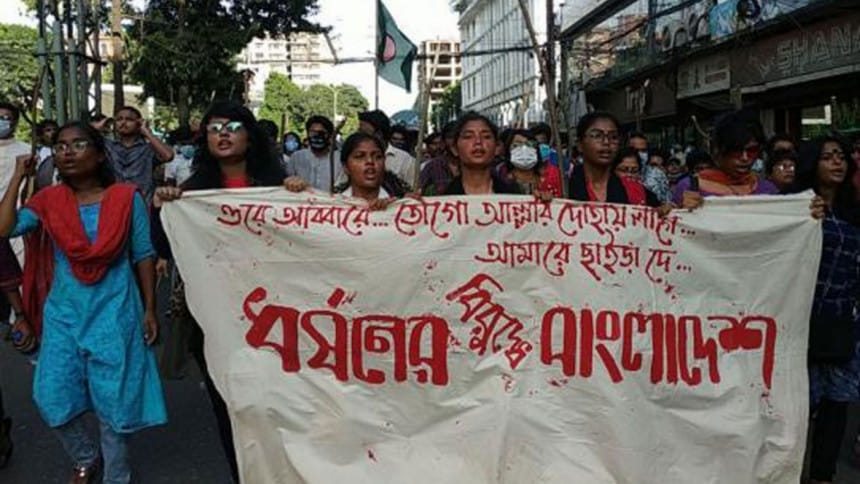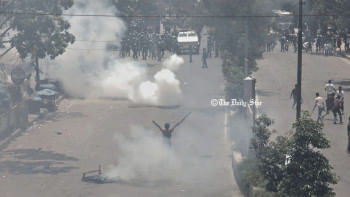The problematic legal definition of rape

The video of a gruesome act of sexual violence on a woman in Begumganj, Noakhali that went viral in early October, and the subsequent reporting on the incident in various media outlets had led many to questions—was it rape or could it be called an attempt to rape, or was it a sexual assault? This confusion is natural since the idea of rape, or of other sexual offences with similar degree, are concepts that remain unexplained even in the key Bangladeshi laws that criminalise such violence.
In the Begumganj case, the details of the video showed that the offenders were sexually torturing the woman using a wooden rod. The violence was no doubt equally brutal as rape; however, traditionally, in seeking justice for such violence, the attack perhaps would not be considered as rape. Reportedly, the first FIR in the incident was filed under section 9(4) and section 10 of the Women and Children Repression Prevention Act 2000 (WCRPA) for attempt to rape and sexual assault; and not for the offence of committing rape. The reason simply is that the way the definition of "rape" stands now, it is difficult for law enforcement agencies to contemplate that such sexual violence can be considered as rape.
Previously, rape was punishable only under the Penal Code of 1860. With the hope of speedier and effective prosecution in cases of violence against women, the WCRPA was enacted in the year 2000. The WCRPA provided increased punishment for rape in varied contexts (punishment for gang rape, custodial rape, etc.). Nevertheless, when it came to defining the offence of rape, WCRPA clearly stated that the definition of rape would be same as the one given in section 375 of the 1860 Penal Code. Which means that although the WCRPA, which is a relatively modern law, had brought several changes in the degree and nature of punishment for rape; for defining the offence itself, the British colonial law is what we have to follow.
The definition of rape in the Penal Code says there has to be sexual intercourse initiated by a man with a woman, and to consider an act as sexual intercourse, "penetration" would be sufficient. The definition stops here without explaining what the term "penetration" means. Adding to this, section 9 of the WCRPA uses the Bengali term Jouno shnagam to refer to sexual intercourse, again without explaining what specific sexual acts such a term may entail. As such, the various arms of the legal system commonly consider penetration in its traditional understanding, leaving out several other ways of sexual penetration which could sometimes be even more violent. Forceful penetration by a sharp object, for instance, may fall outside the realm of "rape" and may be punished as a sexual assault under section 10, which of course is a lesser degree offence.
Rape under section 9 is punishable with mandatory sentences of life imprisonment or death as per the new amendment ordinance. However, for sexual assault, the punishment is maximum 10 years and minimum three years imprisonment. Additionally, unlike section 9, section 10 nowhere mentions the punishment for causing death resulting from sexual assault. As such, what appears is that, in addition to being a lesser degree of offence, if sexual assault causes death of the victim, the WCRPA won't be applicable for her and the case would have to be filed in the ordinary criminal courts for murder under section 302 of the Penal Code.
Because the term "penetration" does not include any further details, the question of proving rape may also depend on the degree of a particular penetration. Especially in cases of child victims of rape, the offender often cannot fully penetrate the victim and then proving that penetration did happen becomes cumbersome for the prosecution. This is precisely the reason that subsequent to the Delhi gang rape case, section 375 of the Indian Penal Code was amended, adding several clauses explaining what forms and extent of sexual intercourse or penetration would amount to rape.
The definition of rape has several other areas of ambiguities and legal inconsistencies that need to be comprehensively reviewed in light of the progressive developments in other domestic laws. The definition does not contemplate a boy child to be a victim of rape, it provides no indication as to what the term "consent" would entail and most importantly, it decriminalises rape by the husband against his child bride, who may be as young as 13 years of age.
Formulating a timely and appropriate definition of rape can be an effective first step in bringing a meaningful change in the rape justice system. Unless the inherent loopholes in the existing laws are seriously addressed, concentrating on the harshness of punishment alone will not yield any meaningful change in rape prosecution.
Taslima Yasmin is a legal researcher and teaches in the Department of Law, University of Dhaka.
Email: [email protected].

 For all latest news, follow The Daily Star's Google News channel.
For all latest news, follow The Daily Star's Google News channel. 



Comments